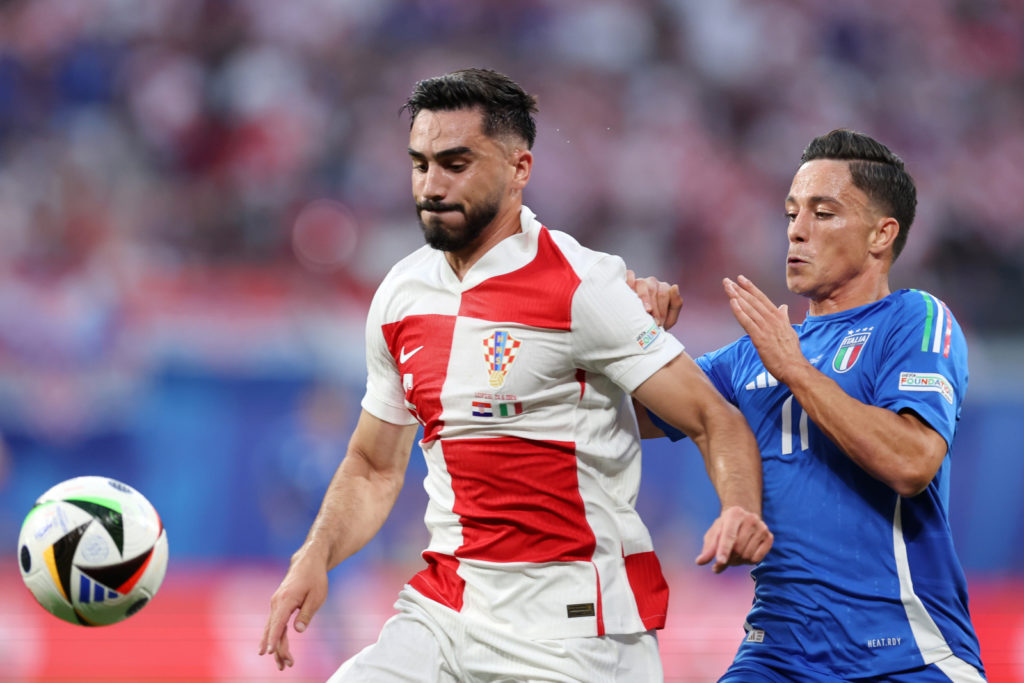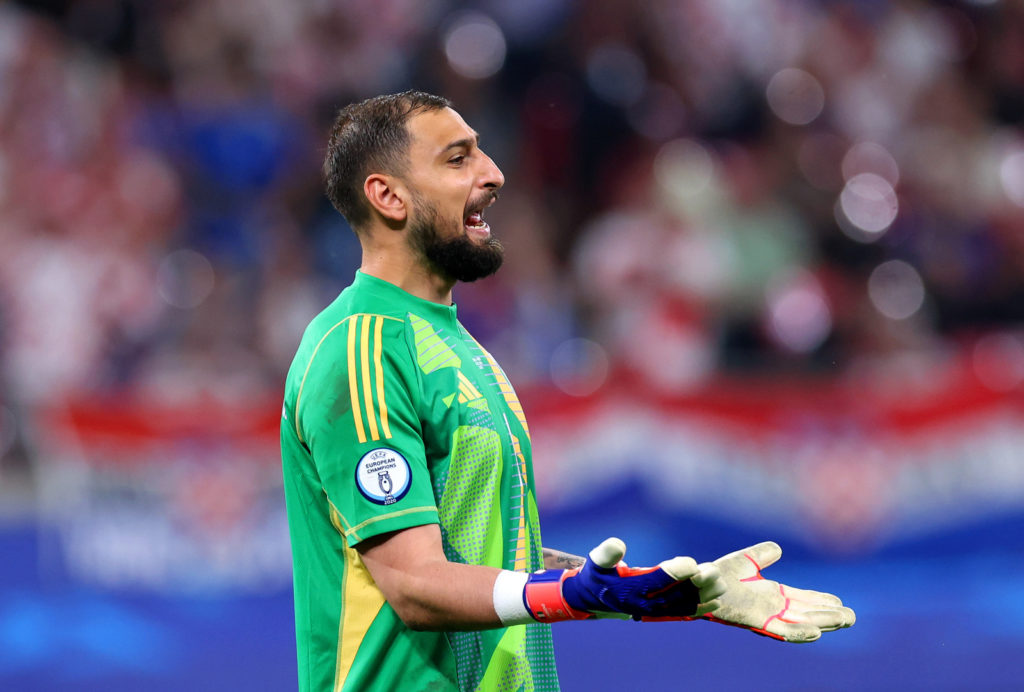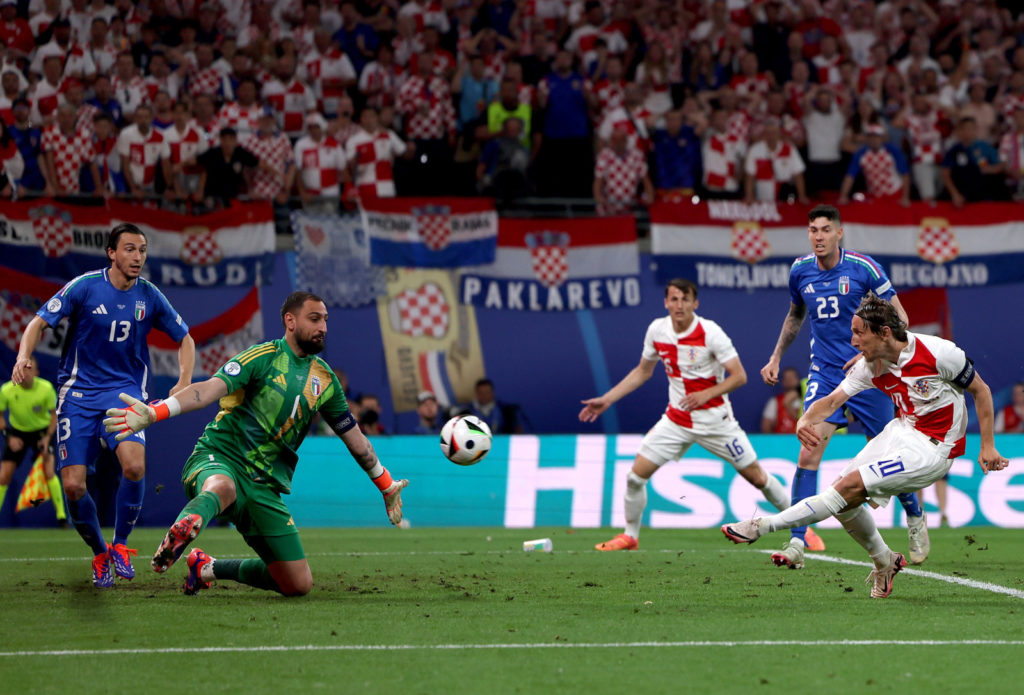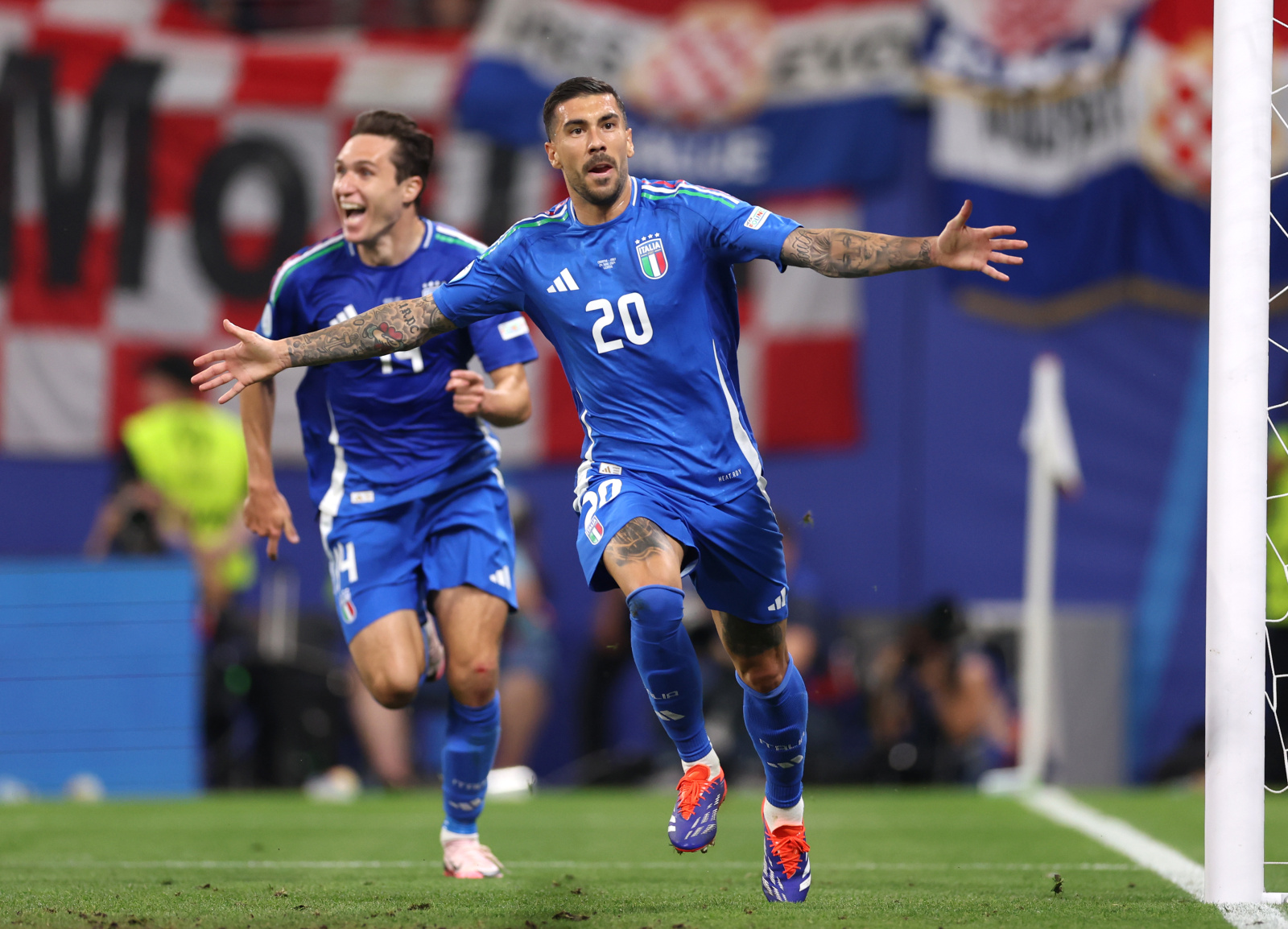June 24 – A thrilling game that ran far deeper than its slender scoreline, Croatia’s sweetheart Luka Modric looked to have cemented his side’s place in the Round of 16 with a decisive goal versus Italy. Until the 8th minute of added time.
A superb, flowing Italian counterattack was capped by a wonder strike from Italy substitute Mattia Zaccagni (pictured) who wrapped his foot around the ball to curl it into the top corner to make the score 1-1.
Italy only needed a point to qualify second in the group thanks to Spain’s simultaneous victory over Albania in Düsseldorf. Croatia had to win to go through but now look to be out of the finals unless England beat Slovenia by three on Tuesday.
Caged inside the Red Bull Arena in Leipzig was an atmosphere so rambunctious that beer rained from the stands above into the unsuspecting press box before the game had even kicked off.
The FIFA ranked nine and ten came head-to-head in a clash that likely marks the final dance in 38-year-old Modric’s iconic Croatia career.
Four days ago, Luciano Spalletti’s Italy side were barely able to lay a glove on Spain, whose victory over the Azzurri was much more convincing than its 1-0 scoreline. The question was whether the Italians could bounce back from such a psychologically draining result.
For vast periods of this game it looked unlikely until the Italians answered the question in dramatic, jaw dropping style.
It was a lapse of concentration in the 95th minute that saw Croatia plummet to joint bottom of the group after their late draw versus Albania – a mistake that meant it was do or die in Leipzig.
And a mistake that was to repeat itself.
Eager to see some kind of change from his side, Spalletti opted for a different shape by converting the classic 4-4-3 to an aggressive 3-5-2, which saw Inter midfielder Davide Frattesi replaced by club mate Matteo Darmian.

Also dropped were struggling strike duo Gianluca Scamacca and Federico Chiesa, with neither player having registered a goal or assist in the tournament.
In their place, Spalletti put his trust in Genoa’s Mateo Retegui who has impressed during his brief tenure in the Azzurri setup. He lined up beside striker Giacomo Raspadori – who played an important role in Spalletti’s Serie A title with run with Napoli.
On the other side of the technical area, Dalic stuck with his favoured 4-3-3 formation but chopped and changed the attack.
He replaced experienced duo Lovro Majer and Bruno Petkovic, who have each featured heavily in the buildup to the competition, with Europa League winner Mario Pasalic and young Salzburg prospect Luka Sucic.
In defence, veteran Ivan Perisic made way for Marin Pongracic, allowing Josko Gvardiol to move into his favoured left-sided position, where he flourished.
Croatia started the match with venom and intent, testing Italian shot stopper Giuanluigi Donnarumma just four minutes into the game. Struggling to shake the weaknesses of their game versus Spain, Italy barely touched the ball in the opening ten minutes.
When they did find themselves on the ball, though, the Italians sought to utilise their pace up front and their newfound width due to the formation change.
With 20 minutes gone, a charged-up Retegui shaved the post with a header following a well-worked move by the Italians, who were beginning to look a far cry from the lineup that faced the Spaniards just four days ago.

Croatia’s composure began to melt away as the Italians established a real grip on the game. A yellow card was soon brandished toward Croatia youngster Luka Sucic for a nasty foul, with frustration clearly getting to the 21-year-old.
Croatian keeper Livakovic pulled off a wonderful point-blank save to deny Nicolo Barella in the 27th minute.
With the game’s chaotic pace renewed, Croatia looked to gain the upper hand with some neat link-up play courtesy of talisman Modric and captain Josko Gvardiol.
Italy’s young centre back partnership of Riccardo Calafiori and Alessandro Bastoni nullified Croatia’s rotated attacking three who lacked pack.
With 45 minutes gone neither team had showed enough intent to win the game.
Italy’s Pellegrini make way for Frattesi who immediately upped the Italian tempo.
On the other side of the technical area, Dalic opted for an attacking switch as veteran striker Ante Budimir entered the pitch in the place of Mario Pasalic.
With the ferocious Croatian support now at their backs, the Italians allowed Croatia more possession in the blue half of the pitch.

Within minutes, Croatia were awarded a penalty by referee Danny Makkelie for a handball inside the box.
Modric stepped up but Donnarumma dived low to his left save in style. Seconds later, Modric redeemed himself from close range with a goal that set the Red Bull arena alight – literally.
Flares erupted around the ground as beer rained from the skies. Croatian voices increased tenfold as the soggy press box hid laptops under desks.
Fuelled by the eruption from the stands, Modric quickly earned a place in the referees book with a nasty sliding challenge on Barella. Finally, the aggression in the stands began to translate on to the pitch.
The muted Italian crowd, further deflated by Modric’s opener, were drowned out by the Croats for the lions share of the half. Regardless, the players continued to press for an equaliser.
Modric bowed out on the 80-minute mark and was met with ringing applause, with the player seemingly having dug his team out of trouble yet again. It was all but sealed that he would don the Croatia jersey at least once more, but the time was still ticking.
The decisive substitution of 29-year-old Lazio winger Mattia Zaccagni, who seemed to sneak on to the pitch with minutes to spare, made the difference for Spalletti’s Azzurri, as he curled the winner into the top corner with 10 seconds left on the clock. It was Italy’s first real demonstration of attacking quality in the Match.
Italy will now face Switzerland in the Round of 16 on Saturday.
Contact the writer of this story, Harry Ewing, at moc.l1741215816labto1741215816ofdlr1741215816owedi1741215816sni@g1741215816niwe.1741215816yrrah1741215816
